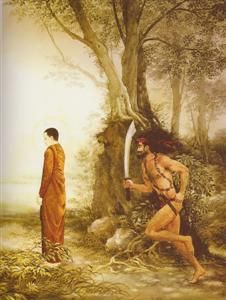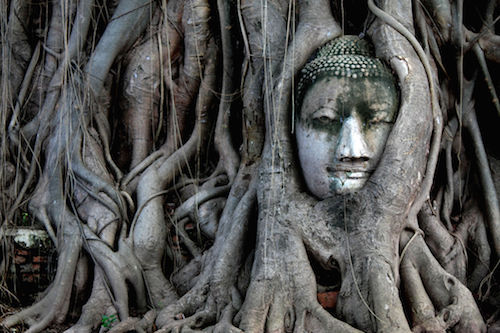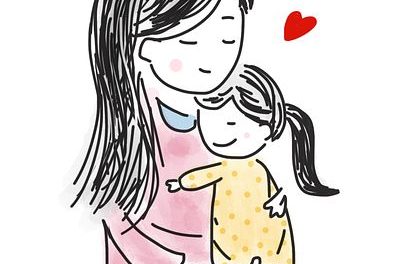By Gerald Stribling
A story famous in Theravada Buddhism is that of the Buddha’s encounter with a serial killer named Angulimala.
It is a simple story, frequently taught to children, with several layers of meaning (also, gristly murder and dismemberment). Kids love that. But like Huckleberry Finn or The Simpsons, Angulimala’s story means different things to dudes of different ages.
In the Pali Canon, Angulimala’s story is pretty cut and dry: a very evil man encounters the Buddha and attains enlightenment.
Angulimala (legend has it) was a super-sized, super-strong highwayman who lived in the jungle in Kosala. He was a highwayman, who stole from travelers on the road through the jungle, killing them and hacking off one of their fingers. The fingers he wore in a really creepy necklace around his neck, so the birds wouldn’t eat the flesh off his collection.
He was a fearsome man.
When the locals started avoiding the road, Angulimala sneaked into villages at night and kidnapped people to kill, and when he killed them, he hacked off a finger and added it to his favorite fashion accessory.
For some reason, a lot of backstory has been added to the tale of of Angulimala—that his father was a Brahmin, and that he’d been a brilliant student at a university, who soured on life because his fellow students, and even his teachers, were jealous of his intellect. The students spread the false rumor that Angulimala (he was called Ahimsaka in those days) boinked his teacher’s wife, and the teacher gave him an assignment to collect a thousand human fingers as a tribute to him before he would allow Ahimsaka to graduate.
Others say that he was just a mean, ornery psychopath who went through an incredible conversion experience. One would be hard-pressed to find a similar story about such a paradigm shift today.
The Buddha, it was said, went walking nonchalantly down the jungle road one day, even though farmers and villagers warned him about the killer in the jungle. Angulimala burst through the vegetation, rushing up and roaring at the top of his voice that he was going to get the Buddha and kill him. But as fast as he could run, for some weird (legendary) reason, he couldn’t catch up to the Buddha, who continued to just ditty-bop along holding his magic parasol.
Finally Angulimala fell exhausted at the Buddha’s feet.
Angulimala saw the light and became a monk. It is an example of how love can overcome hate, and that no matter how bad people are, they can become much better by following the Buddha’s guidance.
But the plot thickens.
It is said that the yokels were accepting of the new, gentle, clean-shaven Angulimala, who I’m sure gained a new name when he joined the fraternity (though I don’t know what it was). What choice did they have? They were ecstatic that he changed his ways and they could take their children for picnics in the jungle without worrying that little Sanjay would be snatched from their midst and hacked to pieces.
But the close family members of some of Angulimala’s victims resented that he got off so easily, when under other circumstances the king, if he ever caught him, would have him decapitated. This story gets bloodier all the time.
One night some of them attacked him with sticks and rocks, and beat him up so badly that he barely made it back to the monastery (and bleeding as I would imagine). Another time, he was attacked by a mob.
That, ladies and gentlemen, dudes and gals, is karma, purely and simply. Karma is no mystery, because it is physics more than anything else. If I follow a secular Buddhist path and do not depend on cosmic make-believe, then I believe that there is no karma that follows you around and transfers from one life to the next. But it sure as hell follows you around in this life.
It’s what I keep telling myself, anyway.
There is anecdotal evidence in my life that indicates that the forces of karma weave me in and out and around and through history like a hockey puck.
The first summer I spent in Sri Lanka, I was supposed to go to Pakistan, and the following summer when I ended up in Sri Lanka again, I was supposed to go to China. Just because I prefer to happily think that when I die I will cease to exist, that doesn’t make it true.
If suffering is a universal truth, then being re-born is just horrible to contemplate. With my luck, I’d come back as a Marine again. Nobody wants to be re-run through Parris Island.
Enlightenment is not behaving ethically and morally because you want to achieve a better rebirth (whether you believe in the afterlife or not).
Enlightenment is about now.
Editor: Dana Gornall
Comments
- Not Sure How to Help Those Who are Down? Just Begin by Showing Up. - December 20, 2018
- Do Buddhists Believe in God? - August 25, 2018
- What is Insight (Vipassana) Meditation? - July 18, 2018







Trackbacks/Pingbacks